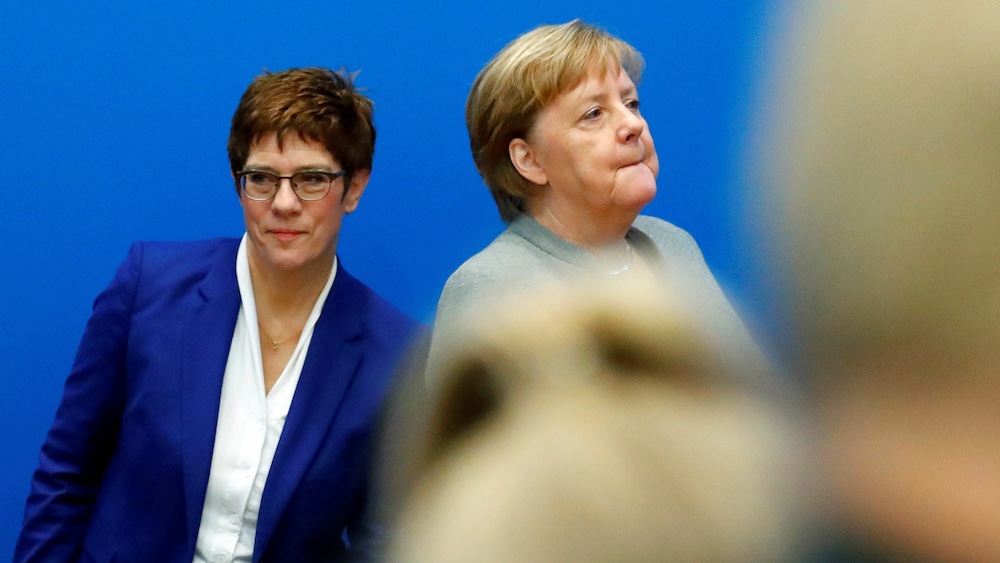Angela Merkel’s chosen successor Annegret Kramp-Karrenbauer has thrown in the towel. Expect fierce leadership and policy struggles.
Here are three takeaways from the earthquake in German politics:
First, the next leader of Germany’s conservatives will be a man—and politically quite different from Chancellor Angela Merkel and her preferred successor Annegret Kramp-Karrenbauer, who announced her resignation on Monday. Personally speaking, my money is on Jens Spahn, the current health minister, over the former CDU grandee Friedrich Merz and North Rhine-Westphalia State Premier Armin Laschet.
Second, the Christian Democrats’ new leader will face Herculean task. He will need to reconcile the different political wings and bridge the deep divide between East and West within the party. He also must find an effective way of countering the rise of the extreme-right Alternative für Deutschland (AfD). Otherwise, Merkel’s CDU risks marginalization.
Third, please look at who has, at least for now, survived once again: Angela Merkel and her grand coalition. Both have weathered hard storms. Merkel is still looking cool and unruffled while her SPD coalition partners appear increasingly frazzled, but don’t count either out. Both the chancellor and her government could last until the end of their regular term in the fall of 2021.
Stability and Turmoil
Germany is a strange mixture of stability and turmoil these days. Despite numerous coalition crises, Merkel is well into her 15th year in office at home and well respected, even admired abroad. A safe pair of hands if ever there was one, she is a safe haven from the rapid, profound changes that have upturned politics in most Western countries.
Germans largely share this view. Angela Merkel continues to be the country’s most popular politician—a truly astonishing feat after such a long time in office. At the same time, a quick survey showed, most Germans do not want her to change her mind about leaving the Chancellery and run for a fifth term in office. Even though they are risk averse, they are conscious of how stagnant the country has become under Merkel.
In late 2018, when she gave up the party leadership, Merkel also promised not to run for chancellor again. With her blessing, the CDU elected Annegret Kramp-Karrenbauer, a centrist from the western state of Saarland, to lead the party. AKK, as she is known, also seemed likely to become Merkel’s successor in the chancellery.
Having Her Power and Eating It
But all too quickly, the fault lines of Merkel’s succession project became visible: you can’t have your power and eat it. Merkel was determined to hold on to control over her government as well as her legacy, and AKK wasn’t ruthless enough to challenge her. As a result, her authority over the party was weak. Of course, she made mistakes, too, both as party leader and later as defense minister. Kramp-Karrenbauer’s doomed proposal for an international security zone in Syria—made with no prior consultation even within the German government—is just one example.
Nevertheless, AKK might have continued and recovered if not for the political impasse in the small eastern state of Thuringia. Regional elections last autumn resulted in heavy losses for the state’s Christian Democrats, who were then faced with a devilish choice: vote for a government led by the formerly communist Left Party, join votes with the far-right AfD to elect a state premier, or accept that no coalition can be formed and call for new elections.
The face and leader of Thuringia’s AfD is the right-wing extremist Björn Höcke, a wily player who managed to lure the CDU deputies into jointly voting for a Liberal candidate. For the first time, a mainstream politician in Germany gained office due to votes from the AfD. Outrage ran high, and the new state premier resigned after only a day. But for AKK, who proved unable to enforce her ban on fraternizing with the AfD, the damage was done. It didn’t help that Merkel interfered from abroad, calling the vote “unforgivable.” The Thuringia CDU has fallen in the polls since the scandal , while the Left Party is gaining support.
Kramp-Karrenbauer threw in the towel on Monday. In her statement, she included a sharp dig at Merkel. “Separating the chancellery from the party chairmanship, the open question of who will be candidate for the chancellery, this weakens the CDU,” she said.
Not So Quick
Yet AKK did not call for a quick changeover of power. According to the timetable she presented, she plans to remain in office as party leader of the CDU until the next regular congress in December. At that gathering, the CDU would choose a new chair, who would also be nominated as top candidate for the next elections. Merkel and her coalition government could remain in place until the autumn of 2021, according to AKK’s plan.
Can the CDU’s leadership issues wait that long? Possibly not, but Merkel’s would-be successors also recognize the dangers of being nominated too far ahead of an election. On Monday, Spahn, Merz, and Laschet all showed a great deal of restraint in claiming the top job.
Whoever it will be, whenever it happens—the new CDU leader’s job is not going to be easy. After nearly two decades of Merkel’s centrist policy, the party is torn between continuing along her line or moving back to the right. There is no consensus, either, about how to deal with the AfD’s success particularly in eastern Germany. After Thuringia, the next regional elections in the East will take place in Saxony-Anhalt and Mecklenburg-Vorpommern, very possibly leading to similar political impasses.
But after this Monday, one thing at least is clear: whether it takes 18 months or less, for Angela Merkel and the stable state she has come to represent, the countdown has begun. Brace for change in Germany and Europe.







